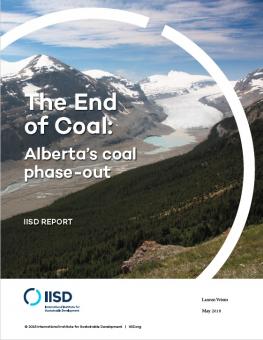
The End of Coal: Alberta's coal phase-out
Alberta implements one of the most ambitious coal phase-outs the world over. What are the politics and economics behind it? Learn more from our new report.
In November 2015, the Canadian province of Alberta committed to a phase-out of coal power by 2030. The phase-out of coal power in Alberta will involve the retirement of over 40 per cent of Alberta’s 2016 installed capacity and the de facto phase-out of local thermal coal mines.
Alberta's coal phase-out is part of the province's wider Climate Leadership Plan. To implement the phase-out, Alberta's NDP government relies on three pillars. First, the government announced a CAD 1.1 billion payout to coal power companies under Off-Coal Agreements that aim to ensure political longevity and foster a positive investment climate. Second, CAD 45 million has been allocated in programming to transition coal workers and communities. The funding for Off-Coal Agreements and transition support to workers and communities comes from carbon tax revenues. Third, Alberta launched a new electricity market design to bring in replacement power. While public opinion is still divided, Alberta’s solution gained the support of organized labour, power companies, public health advocates, environmental non-governmental organizations and the federal government.
This paper explores the circumstances leading to the phase-out and the actions taken by affected players for those who may draw inspiration and lessons from Alberta: policy-makers, campaigners, environmental groups, the coal industry and others transitioning to a low-carbon economy in Canada and the world over.
You might also be interested in
Rethinking Investment Treaties
The reports maps out how the treaty system can be redesigned from the bottom up to accelerate—rather than obstruct—genuine sustainable development and international cooperation.
Transitioning Away From Oil and Gas
At COP 28, 198 governments agreed to transition away from fossil fuels. What are the next steps for a global phase-out of oil and gas production?
Canada's greenhouse gas emissions climbed in 2022, after pandemic slowdown
Canada's greenhouse gas emissions rose in 2022, as the economy rebounded from the pandemic slowdown, according to new figures released by the federal government. The new National Inventory Report data shows emissions reached 708 megatonnes in that year, compared with 698 megatonnes in 2021. But Environment Minister Steven Guilbeault said the 2022 numbers are a sign his government's climate policies are working, with emissions totals the lowest in 25 years aside from the pandemic years.
Greenhouse-gas emissions falling, but oil-sands emissions continue to climb, federal report says
Federal climate policies have begun to make a dent in overall greenhouse-gas emissions, but oil-sands emissions continue to climb, raising questions about how the country can meet its overall targets as producers ramp up production to feed the Trans Mountain expansion system.